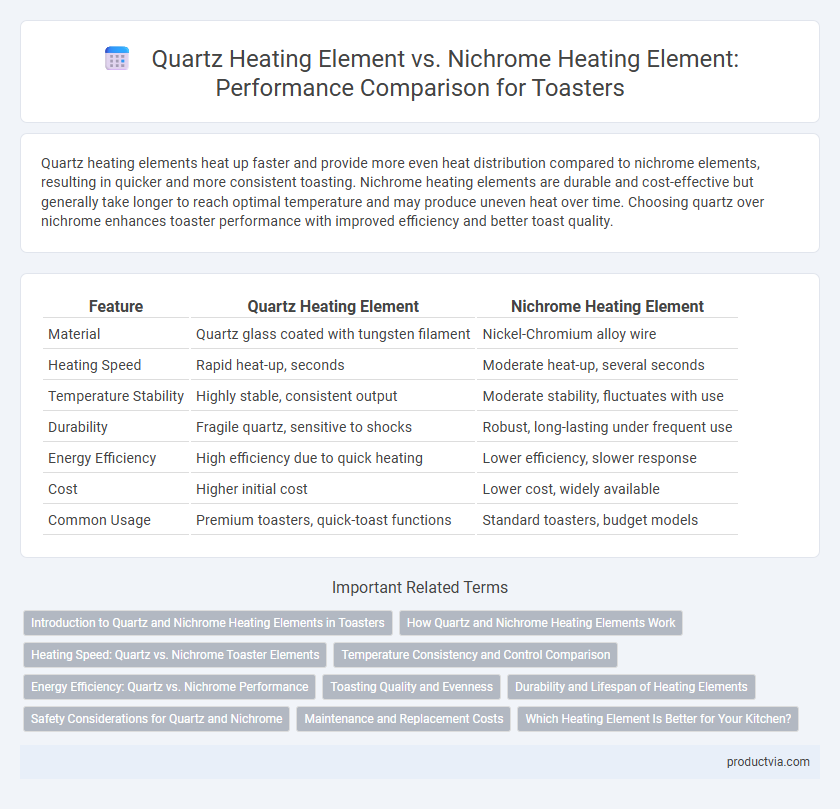Quartz heating elements heat up faster and provide more even heat distribution compared to nichrome elements, resulting in quicker and more consistent toasting. Nichrome heating elements are durable and cost-effective but generally take longer to reach optimal temperature and may produce uneven heat over time. Choosing quartz over nichrome enhances toaster performance with improved efficiency and better toast quality.
Table of Comparison
| Feature | Quartz Heating Element | Nichrome Heating Element |
|---|---|---|
| Material | Quartz glass coated with tungsten filament | Nickel-Chromium alloy wire |
| Heating Speed | Rapid heat-up, seconds | Moderate heat-up, several seconds |
| Temperature Stability | Highly stable, consistent output | Moderate stability, fluctuates with use |
| Durability | Fragile quartz, sensitive to shocks | Robust, long-lasting under frequent use |
| Energy Efficiency | High efficiency due to quick heating | Lower efficiency, slower response |
| Cost | Higher initial cost | Lower cost, widely available |
| Common Usage | Premium toasters, quick-toast functions | Standard toasters, budget models |
Introduction to Quartz and Nichrome Heating Elements in Toasters
Quartz heating elements in toasters offer rapid heating and precise temperature control, enhancing browning consistency and energy efficiency. Nichrome heating elements, composed of nickel-chromium alloy, provide durability and reliable resistance but heat more slowly and less uniformly compared to quartz. The choice between quartz and nichrome affects toaster performance, with quartz elements delivering faster toasting times and improved heat distribution.
How Quartz and Nichrome Heating Elements Work
Quartz heating elements utilize infrared radiation to deliver rapid and consistent heat by converting electrical energy directly into radiant heat, enabling faster toasting cycles and enhanced energy efficiency. Nichrome heating elements function through resistive heating, where electric current passes through a nickel-chromium alloy wire, producing heat via electrical resistance that evenly heats the toaster coils. Quartz elements typically offer more targeted and quicker heating due to their radiant heat emission, while nichrome elements rely on conductive heat transfer for uniform temperature distribution.
Heating Speed: Quartz vs. Nichrome Toaster Elements
Quartz heating elements in toasters deliver faster heating speeds compared to nichrome elements due to their ability to reach higher temperatures quickly and maintain consistent heat output. Nichrome elements, made from a nickel-chromium alloy, heat up more slowly but provide steady and durable performance over extended use. The rapid temperature rise in quartz elements enhances toasting efficiency, reducing cooking time without compromising evenness.
Temperature Consistency and Control Comparison
Quartz heating elements provide faster heat-up times and more precise temperature control compared to nichrome elements, resulting in consistent toasting performance. Nichrome elements tend to have slower responsiveness and less uniform heat distribution, which can cause uneven browning. The superior temperature consistency of quartz elements ensures better energy efficiency and enhanced toast quality.
Energy Efficiency: Quartz vs. Nichrome Performance
Quartz heating elements in toasters offer higher energy efficiency compared to nichrome elements due to their rapid heating and better heat retention properties. Nichrome elements, while durable, consume more power to reach and maintain the desired temperature, resulting in higher energy usage. The improved thermal response of quartz elements allows toasters to operate at lower power settings without compromising performance, reducing overall electricity costs.
Toasting Quality and Evenness
Quartz heating elements provide rapid, consistent heat distribution enhancing toasting quality by producing evenly browned slices with minimal hotspots. Nichrome heating elements tend to have slower heat response and can create uneven heat patterns, resulting in irregular browning and less consistent toast texture. The superior thermal conductivity of quartz ensures better evenness and precision in toasting compared to nichrome.
Durability and Lifespan of Heating Elements
Quartz heating elements in toasters offer superior durability and a longer lifespan compared to nichrome elements due to their resistance to oxidation and corrosion under high temperatures. Nichrome heating elements tend to degrade faster as repeated heating cycles cause oxidation, leading to brittleness and eventual breakage. Consequently, quartz elements maintain consistent performance over extended use, making them a more reliable choice for long-lasting toaster heating components.
Safety Considerations for Quartz and Nichrome
Quartz heating elements offer enhanced safety by operating at lower surface temperatures, reducing the risk of burns and fire hazards in toasters. Nichrome heating elements, while durable and efficient, can reach higher temperatures that require robust insulation to prevent overheating and electrical risks. Proper design and safety mechanisms are essential in both heating elements to ensure user protection and appliance longevity.
Maintenance and Replacement Costs
Quartz heating elements in toasters offer longer lifespans and higher energy efficiency, reducing the frequency of replacements and lowering long-term maintenance costs. Nichrome heating elements tend to degrade faster due to oxidation and brittleness, leading to more frequent repairs and higher replacement expenses. Investing in quartz elements can minimize downtime and costs associated with maintenance and part replacement.
Which Heating Element Is Better for Your Kitchen?
Quartz heating elements offer faster heat-up times and more precise temperature control, making them ideal for toasting with consistent browning and energy efficiency. Nichrome heating elements are durable, cost-effective, and provide even heating but generally take longer to reach optimal temperature. For kitchens prioritizing speed and energy savings, quartz is superior, while nichrome suits budget-conscious users valuing reliability.
Quartz heating element vs nichrome heating element for performance Infographic

 productvia.com
productvia.com